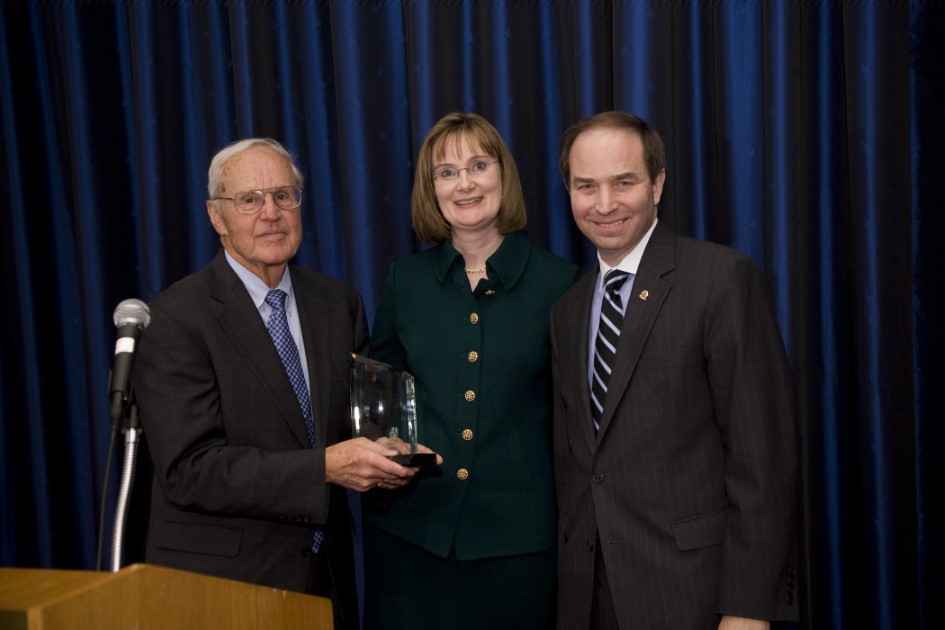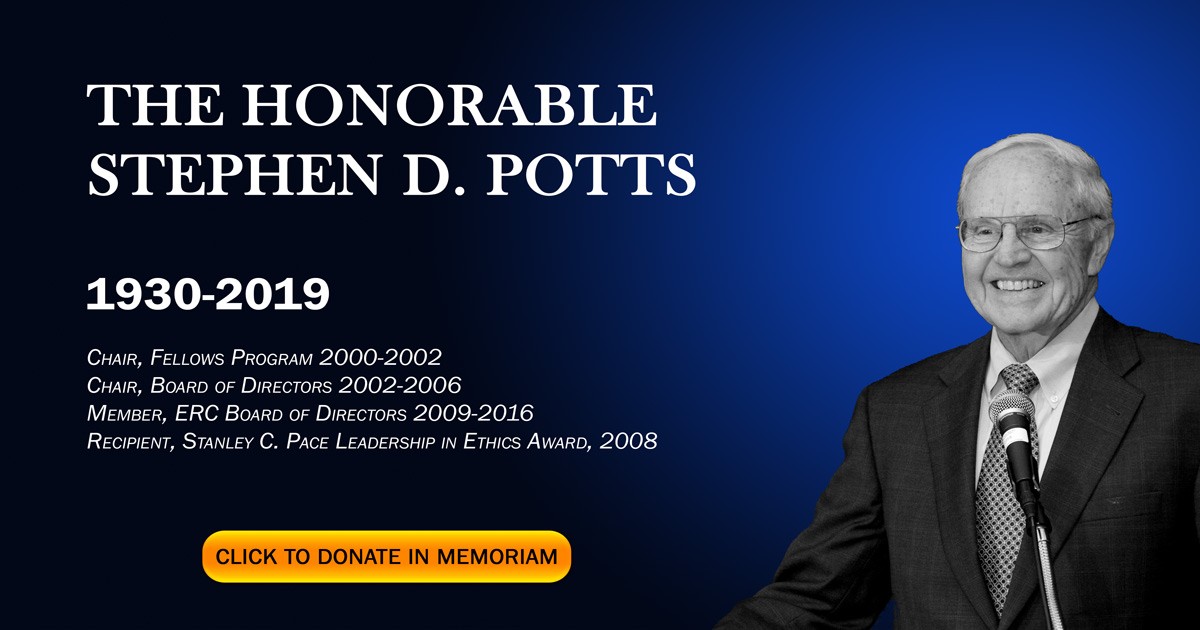Our world has lost a remarkable man, The Honorable Stephen D. Potts. Steve was a public servant, an honorable statesman, and a kind-hearted soul. He was deeply committed to ethical conduct in organizations, which he embodied throughout his professional career. Among his achievements, he served as Associate Counsel to the President under George W Bush and as Director of the US Office of Government Ethics under Presidents George H.W. Bush and Bill Clinton.
Steve was also an unwavering supporter of the ECI. He was chairman of our board, Chair of our Fellows Program, and even served as interim president for a short while. He was not only dedicated to our cause; he was dedicated to our staff. For me personally, he was a trusted friend, a wise counselor, and a role model.
I can think of no better way to pay tribute to Steve than to share an excerpt of the remarks I delivered when the ERC Fellows presented the Stanley C. Pace Leadership in Ethics Award to Steve in 2007. At the time, I wrote these words to honor a man who, in just a few short years, had already enriched my life in innumerable ways. He has continued to bless me with his friendship and support to this very day.
———————————————————————————————————————
2007 Stanley Pace Ethics in Leadership Award Presentation

2007 Stanley Pace Award Presentation. Left to right Stephen Potts (recipient), Pat Harned (presenter), and Stephen Kasloff (nominator).
Remarks Offered by Patricia J. Harned
One of the nice things about the Pace Award is that for us – a group of ethics and compliance practitioners who spend most of our days solving problems where ethics are clearly absent – the Pace nominations cause us to pause and think about what leadership really looks like when ethics are present.
When selecting our Pace Award recipients, we choose individuals who have demonstrated a number of qualities:
- Unwavering integrity,
- Demonstrated moral vision, and
- An ability to translate that vision into specific goals.
Yet what is unique about our recipient this evening is that he is a different kind of leader altogether:
- He didn’t start a new organization;
- He was not the chief executive of a corporation; and
- He was not defined by a single event that called for a courageous act.
Stephen Potts is our recipient this evening because of his steady ethical leadership throughout his entire career – often serving as the leader behind the leader.
Theodore Roosevelt once said, “The best executive is the one who has sense enough to pick good men to do what he wants done, and self-restraint to keep from meddling with them while they do it.”
Already you have heard highlights of Steve Potts’ remarkable career, and the ways he has been trusted by powerful men and women to carry out some important tasks…with a few notable moments of standing up to an executive or two in order to keep them on the right path. Yet most of us here have known and worked with Steve for quite a while. Therefore, for the next few minutes I would like to talk about Steve Potts, the ethical leader I know.
Yesterday I called Steve to talk about the plan for this evening – how to get to the hotel, the order of events, etc. He and I ended up having one of our periodic discussions about one of the most important issues that we think our generation faces today…the need for us to see Roger Federer win the French Open so that he can at least claim a career slam in professional tennis.
We used to talk about that more often than we do these days; nevertheless, I hung up the phone and thought about the fact that even now Steve takes my calls. Even though I know, he does not really have time to. He always asks about the ERC, and he listens to the answer. Even though I know, he does not really have time to.
So I wonder…is that ethical leadership? One could argue that such behaviors are just good southern manners at work. However, I think it is more than that.
I have heard people describe Steve in the following ways:
- Patient;
- Humble;
- Gentle in spirit; yet
- Steadfast;
- Principled; and
- A true statesman.
These are not just pleasantries – they are character traits. They often show up in small ways, but they have a tremendous influence.
Steve was Chairman of the ERC Board and frequently in our offices when he was offered the opportunity to join the White House staff. I got a chance to talk with Steve a little bit while he was considering whether he would take the position. What was remarkable to me was that in thinking through his “must haves” for the job, he was less concerned about title, salary, or political agendas. I am sure those things were somewhat important, but to me his real criteria were:
- The character of Fred Fielding as his future boss;
- The opportunity he would be given to address a few ethics issues in government that he had left undone while he was at OGE; and perhaps most importantly
- The obligation he felt to serve his country.
Steve thought about the high regard he had for the office of the President, and he drew on his knowledge of members of the Bush family to be intensely loyal leaders. You might want to argue the politics of Steve’s decision, but what struck me was that he looked at the character of the leaders before he decided whether he would follow. Wouldn’t it be nice if all our employees did that?
I, of course, told Steve when he took the job that I would like a personal letter from the President thanking me for my sacrifice for my country in letting him step down as chairman of the ERC board. I am still waiting, by the way…
I have had the pleasure of working with Steve in a variety of his roles with ERC:
- Member of the Fellows Program
- Chairman of the Fellows Program
- Member of the ERC Board
- Interim president of the ERC (a year I’m sure he’ll never forget)
However, for me, the most important time was when I worked with Steve during his tenure as chairman of the ERC board. Steve became chairman as I became acting president; at a time when neither of us probably knew all that was in store for us.
I have said this before about Steve, but it is worth repeating myself here – in my first days as president, Steve sat me down and said to me, “No matter what, I will always advocate for you.” I knew that there were limits to that promise, but so long as I was advancing the cause of ethics, Steve would support me. I had confidence in Steve’s commitment because he had already shown me in so many ways that he had an abiding commitment to our organization, and a much larger passion for ethics. Wouldn’t we like all our chairpersons to be like that?
I have only known Steve for a few years, but I think one does not have to know him too long to see that he is not a chameleon – he does not change who he is based on the person whose presence he is in. Steve’s character has been slowly and steadily revealed, and many of the decisions he has made throughout his career evidence it. That, my friends, is integrity: an earned reputation of having displayed ethical values over time.
I want to close by sharing an excerpt of my very favorite Steve Potts speech. Steve was asked to give the commencement address to the graduating class of 2002 at the Darlington School – an independent prep school, and one of Steve’s alma maters.
Steve remembered what it was like to be a graduate, and he knew that if he delivered a speech with many platitudes, nobody would listen. So he asked me to help him carry out what I thought was a brilliant plan. We drafted a survey that was distributed to the senior class, and Steve delivered a speech that quoted the graduates to the graduates themselves.
Here is my favorite part:
Let us hear from you, since you and your classmates had some profound thoughts to share. You said, “Learn something new every day.” “Life’s a dance, you learn as you go.” “You’ve got to stand for something, or you’ll fall for anything.” “Roll with the punches.” “The Lord works in mysterious ways.” These are all age-old maxims that it is nice to know have been passed on to you. However, I also have to share my very favorite quote offered by the Darlington Class of 2002. ‘Eagles may soar, but weasels don’t get sucked through jet engines.’
We may laugh, but there is some truth to that statement. During the 35 years I spent practicing law for both the military and a private firm, as well as the ten years I spent as the head of the Office of Government Ethics, I have seen my share of both eagles and weasels.
There are some important characteristics to these animals. Where weasels stay close to the ground, eagles take to the air. While weasels take over their victims’ nests, eagles build their own nests, and nurture their young out of them. Weasels live a safe existence while eagles take risks. Weasels have a very limited perspective. Eagles see the world.
I have served under two Presidents, worked with foreign governments, and counseled corporate CEOs, and I can tell you that my experience proves what you already know. Weasels aren’t sucked into jet engines because they don’t put themselves in their path. But, that also means that they never glean the full value that comes from soaring, and learning what is important from the experience.
Steve, it might have been tempting for you to think that as a person who has been such an important part of the ERC family, you won the Pace Award by popular vote. I stand here to tell you that as much as we love you, that was not the reason.
You have been a true ethical leader, influencing not just us, but leaders worldwide, and surpassing several generations. You are an example to all of us, and it is our great privilege to recognize you with this award.


